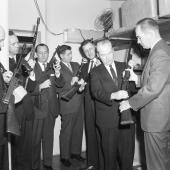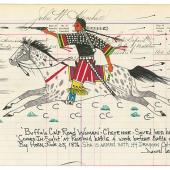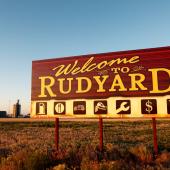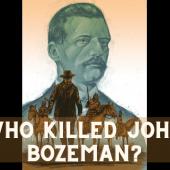The Kidnap and Ransom of Froggy Doo

It was one of those gorgeous Montana autumns that we all hope for at the end of every too-short summer. Billings was awash with red, yellow and orange as the trees reluctantly surrendered their leaves to the wind, and people were easing into sweater weather, enjoying a few extra days of above-average temperatures before the inevitable snowfall ushered in another long, cold winter.
Then an unspeakable crime sent a sudden chill through the city, plunging its residents into a mild panic. It was an atrocity so shocking that it was mentioned on the national news. They even made a movie about it. One of Montana’s most beloved television personalities had been abducted, and the bizarre ransom demand that followed drew the attention of the FBI. The perpetrators were never caught, and the victim was found a short time later, dismembered, his body parts strewn along a fence line outside of town, his decapitated head hanging from a post.
Luckily, the body parts were reunited, the head reattached, and the victim was able to return to his popular children’s TV show, “Froggy Doo and Happy Herb.” Froggy Doo the beloved marionette was as good as new.
“They tore him apart pretty good,” said “Happy” Herb McAllister from his home in Kalispell, where he lives with his wife Janet. “The mouth was torn out and the head was off. We had to put him back together again. We had quite an operation there.” Herb built the Froggy Doo character in 1956 for “The Happy Herb Show,” introducing the puppet on Halloween a year after the show debuted on KFBB in Great Falls. In 1963 McAllister brought his program to a much larger audience at KGHL-TV (now KULR-TV) in Billings. “The Happy Herb Show” was a hit.
Magic was McAllister's original love and his entrée into children’s entertainment. A talented visual artist as well, he designed and constructed studio sets in Great Falls for the cooking show, the news, and other shows including, of course, his own. “We built a pumpkin patch, and we built a castle, because that’s where a magician usually lives,” said McAllister. “Froggy Doo lived in the pumpkin patch, along with an alligator and a witch.” Once “Happy Herb” became established in Billings, Froggy Doo’s fame rose on an Elvis-like trajectory. His raucous young fans packed the studio audience for every episode, and McAllister kept them entertained with stories, songs, magic tricks, and nonstop hijinks from Froggy Doo and his puppet cohorts. Happy Herb would look directly into the camera and ask his young viewers at home to send jellybeans to the station because that’s what frogs used for money. Froggy Doo’s admirers responded in a big way, mailing in thousands of jellybeans along with their drawings and letters. The lumpy envelopes jammed the post office’s sorting machine to the point where extra employees were hired to hand-cancel the mail until the gummed-up gizmo could be replaced. Froggy Doo, all 22 inches of him from the tip of his red sneakers to the giant eyeballs atop his balsa wood head, was the most famous personality in Billings. The show was even renamed “Froggy Doo and Happy Herb,” to give the star top billing. McAllister had no problem with that. “The frog was nine-tenths of the show!” he said with a laugh. The station bigwigs certainly knew a good thing when they had it—the show went from weekly to daily.
Thousands of Billings kids plopped down on the rug every afternoon to catch the show, enthralled by Herb’s magic tricks, Froggy Doo’s mangling of nursery rhymes in the Fractured Fairy Tales segment, and the exploits of the show’s other characters like ventriloquist’s dummy C.T. Woodley and B.J. Crow. His amphibian sidekick’s appeal wasn’t hard to figure out, said McAllister. “Froggy Doo was a scamp, and he did things that all the children wanted to do but couldn’t. And he’d get away with it.”
One morning in October, 1966, McAllister arrived at the studio on Coburn Hill near Sacrifice Cliff, to discover that Froggy Doo was missing. “I went to get him for the TV show for that day, and he was gone. We hunted all over for him. I thought maybe I’d left him at home in my art studio or somewhere.” The frog was nowhere to be found. The show limped along for several episodes without its star, placating Froggy’s fans with half-baked excuses about him having an accident or otherwise being indisposed. Soon enough, Herb’s most unthinkable suspicions were confirmed with the delivery of a ransom note: Froggy Doo had been kidnapped.
“A couple days later we get the letter in the mail saying they want 150 bucks and a roll of quarters, and I’d have him back,” said McAllister. Word quickly spread about the stolen frog. Many of the younger viewers believed Froggy was real, and it seemed to anyone under the age of 12 that they’d had their best friend taken away.
The thieves had also made off with several thousand dollars’ worth of electronic equipment from the studio, but it was Froggy Doo’s abduction that grabbed the headlines. Jane McAllister (no relation) grew up in a Billings family that had the misfortune of being the only McAllisters listed in the phone book. She remembers the panic that gripped the grade school set as kids desperately tried to reach Happy Herb. “When Froggy Doo was ‘frog-napped’ we had loads of hysterical kids calling our house. Sometimes my brother would imitate Froggy Doo’s voice and tell the kids he was okay, he was just taking a vacation.”
Herb and the TV station refused to pay the ransom, even after a young man claiming to be one of the kidnappers followed up the ransom note with a phone call demanding the cash. The curious request for a roll of quarters led authorities to believe they were dealing with a couple of young pinball fiends. Because the ransom note had been sent through the mail—a federal offense—the FBI became involved. They conducted interviews, chased down leads, and working alongside the Sheriff’s Department to follow up every clue. The story gained traction, even getting a mention on the “Huntley Brinkley Report,” a nationally televised news program. Despite all the attention and the thorough efforts of law enforcement agencies, no suspects were ever found.
But Froggy Doo was.
According to McAllister, a youngster riding his horse in the countryside near Billings came upon the marionette, which had been torn to pieces and scattered along a fence. The head was found nearby, dangling from a fencepost. Froggy Doo was gathered up and returned to McAllister, who was relieved when a pair of deputies carried his mutilated friend into the studio. “They had him on a little stretcher,” he said, chuckling at the memory. “He was covered up with a blanket.”
While in retrospect he can find some humor in the story, McAllister still remembers the anguish caused by the disappearance and destruction of his TV partner. “It was kind of traumatic for me at the time. It was a serious thing that happened, when they destroyed him and I had to rebuild him and all that kind of thing. To me it wasn’t a big joke at all. It’s still not.”
McAllister was able to reassemble and repair Froggy Doo, and the puppet, apparently recovered from the trauma, resumed his place on the TV show, which ran until 1977.
In 2007 a feature film was produced based on a screenplay written by T.J. Lynch, a Billings native who, like many, had the Froggy Doo kidnapping seared into his childhood memories. A Plumm Summer starred Henry Winkler as Happy Herb, and was shot mostly in Livingston and Bozeman. The largely fictionalized movie has its moments, but it left Happy Herb and Janet underwhelmed. In particular, Herb was disappointed with Winkler’s milquetoast depiction of the energetic kids’ show host. “Man, I was alive!” he says. “I was always very animated and, man, I loved to work. I loved the magic. I loved the puppets, loved everything. And I loved the kids. When he portrayed me, I thought, wait a minute, that isn’t the way I acted. It kind of disappointed us.”
“Froggy Doo and Happy Herb” was back in the regional news as the movie was getting underway, and the renewed attention produced an unexpected development. Bill McColley of Billings went public with a secret he’d been sitting on for 40 years—he knew the identities of Froggy Doo’s kidnappers.
His brother, Harold “Butch” McColley and cohort, Jerry “Parakeet” Pearl, he claimed, were the ones who broke into the TV studio and took the frog, along with a pile of electronic gear. “This is the real story, I guarantee you,” McColley told a Billings reporter in 2006.
According to McColley, Parakeet and Butch, both in their early 20s, were pounding back a few one night when Parakeet suggested they steal the famous frog. Butch went along, and once they’d taken Froggy Doo from the studio they brought him straight to Bill McColley’s house and woke him up to show off their prize. “There’s my brother with the frog,” McColley said. In the days after the crime, the reckless pair took the frog around to display at keggers and parties. Once they realized their ransom demands weren’t going to be met, they gave up on their scheme and ditched the puppet somewhere it would likely be found. The TV equipment was later recovered, and as authorities began to close in on them, Parakeet went on the lam, fleeing to Southern California. No arrests were made.
While elements of McColley’s claims have been corroborated, the perpetrators are, unfortunately, no longer around to tell their side of the story. Butch died of leukemia in 1967 and Parakeet was killed in a car accident in 1987.
These days Froggy Doo and C.T. Woodley are resting safely in McAllister’s art studio near his Kalispell home. Herb is an accomplished painter and has been teaching college and adult classes for decades, and still teaches the occasional class at the Kalispell Senior Center. After leaving television in 1977, he moved to Palm Springs to resume his painting career. He later returned to Billings, then settled in Kalispell. He still makes the occasional public appearance, sharing the stage with Froggy Doo, performing magic tricks, and telling stories from the heyday of Billings’ most treasured kids’ show. He has also written a series of children’s books.
If you’re heading for the internet to hunt down some Froggy Doo video, don’t bother. The only other place Froggy Doo exists now is in the memories of those who grew up watching the show. Sadly, all the tapes recorded from the show were destroyed under shady circumstances in a fire. As the station was moving to its new location downtown, McAllister drove out to the hilltop studio one day to see if he could save the tapes. When he got there, he found the station manager tossing all the tapes into a fire, along with signs and other memorabilia from the set. He refused to explain his actions to the stunned magician.
“It’s sad that somebody destroyed them and we could never figure out why,” McAllister said. “I talked to him about it and nothing was ever done. It was terrible. I almost cried when I got up there, and there it was in a burn pile. It was just kind of devastating because there was a lot of history lost there. I just walked away from it. I left.”
The tapes may have gone up in smoke, but you can ask any Billings native of a certain age if they remember “Froggy Doo and Happy Herb,” and you’ll see their eyes light up. They’ll go all dreamy as they drift back in their minds, recalling those joyful memories, those carefree afternoons gathered in front of the family television set, laughing and clapping at the exploits of Montana’s most celebrated frog.












Leave a Comment Here